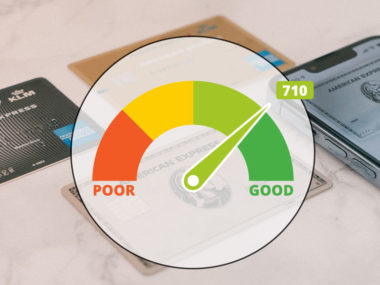It’s quite likely you can’t afford to pay for a car upfront, especially if you want a top of the line, brand new car. That means you will likely need to get a car loan in order to pay for it. To get a car loan, a lender will need to check your credit to make sure they can trust you with their money. That means you’ll need a strong enough credit score to prove you can be trusted with the loan.
The most common credit score source lenders will check is your FICO score. A FICO score gives lenders a good idea of how well you’ve handled loans and credit cards in the past, and how able you are to pay back debts. A lower score means a higher risk for the lender, and indicates that they may not get the loan paid back in full.
A higher or lower credit score not only affects your ability to get a car loan, but also what kind of terms are part of the loan. A higher credit score will mean lower interest rates, easier to handle monthly payments, and more flexibility where you need it. The best terms typically become available at a FICO score of 700 and up, but you can still qualify for a loan at lower rates.
Table of Contents
What is a Good Credit Score for a Car Loan?
The lowest your credit score can be in order to get a good car loan is 661. Anything below that and you’re typically in a subprime loan market. If you have a credit score of 781 or above, then you’ll qualify for super prime terms. That means getting the best APR possible, and paying less for the car in the long run.
How Can I Improve My Credit Score to Get Better Car Loan Rates?
If you’re right on the cusp of having a good credit score (almost to a 661), it might be in your best interest to wait a little bit until you build your credit score up higher. There are a few things you could do to help raise it enough in a few months, in order to get in that good credit score range.
First, get copies of your credit reports from the major credit bureaus and look it over. It will be a record of your credit history, all of which influences your credit score. Maybe you have several negative items on your report from a long time ago, such as some missed credit card payments. After 7 years, those items drop off your credit report completely, meaning your score will raise when they are gone. If they are 6 years and 11 months old, wait a month and your score should raise.
You could also add new examples of responsible credit use to your credit reports if you don’t have much activity on them. Use a credit card to make some of your regular purchases and then make sure you pay them off on time. By doing so, you add positive activity to your report, which can help raise it. Just make sure not to go overboard and put yourself in credit card debt.
Finally, you can use our letter templates to dispute errors on your credit report.
What is the Minimum Credit Score for an Auto Loan
The average scores for buying a new car are typically in the 600-700 range, but you can get a car loan with a score lower than that. 500 is normally the lowest most lenders will consider for a loan, as anything lower is a serious warning sign of somebody who isn’t responsible with their credit, and cannot be trusted to make timely payments.
What is a Subprime Auto Loan?
If your credit score is 600 or lower, you have what is called a “subprime credit score.” While you can still get an auto loan, you should expect higher interest rates and additional expenses. They can also have extra conditions to the loan that aren’t part of normal loans, including an extra fee if you try to pay off the loan early.
Raising Your Credit Score
Having poor credit is not a lifelong condition, you can work your way out of it. A good first step is to look over your credit reports and see if credit repair might be a good solution. If you have a history of missed payments or recently suffered from credit card or identity theft, your credit report might be filled with inaccurate information.
Any negative item on your credit report can be removed if it has a mistake in it. The mistake can range from the person listed on it isn’t you (because of mistaken or stolen identity) to being a penny off on the missed payment. By sending a letter to the credit bureau detailing out the mistake, you may get it removed from your report, which could then boost your credit score.
Next, make a plan to be responsible with your existing debts and credit cards. Before taking on new debts with a car loan, try to eliminate any outstanding credit card debt or other small loans you have out. Then, keep up on payments like rent or regular bills, as these usually get reported to credit bureaus too.
What Are Good Terms for a Car Loan?
How do you know you aren’t getting bamboozled on your car loan, even though you have good credit? Well, here’s what you can expect when it comes to loan rates if you have good credit.
If you are buying a new car and have 661 or above credit score, your rate should be around 3.59 percent or lower. If you have a 601 to 660, then that should be 6.39 percent. If you are getting a used car with 661 or above credit, the average rate should be 5.12 percent, and a 601 to 660 should get you 9.47.
That’s just for interest rates though. Remember that there are other terms to consider in your loan. Find one that works for your finances. Look at how long the loan is supposed to go for, how much per month they want, and whether they will let you pay off the loan early.
The terms of any loan aren’t rock solid until you sign the contract, and even then, you can later refinance the loan. Try to negotiate to get the loan you want. Maybe you can lower the monthly burden by extending the length of the loan or by putting more money down at the beginning. You can also negotiate the price of the car in order to reduce the amount of financing you’ll need to make the purchase; both of these are important areas of negotiation you should not shy away from.
Whether You Have Good or Bad Credit: Shop Around for the Best Rates
There are many places you can get an auto loan. You don’t have to go with just the dealer’s offer for a loan, you have options. Get pre-approved from a variety of places, including your bank, local credit unions, private lenders, national and local institutions, and more. Remember, getting pre-approved won’t hurt your credit score as it uses a soft inquiry, so get as many as you can.
Then, negotiate using the pre-approvals. Go to lenders and say “You are offering this much, but another place is giving me a better deal. Can you beat their offer?” Make them compete against each other for your business. That way, you get the best deal possible in the end that you can afford.
Image Source: https://depositphotos.com/





